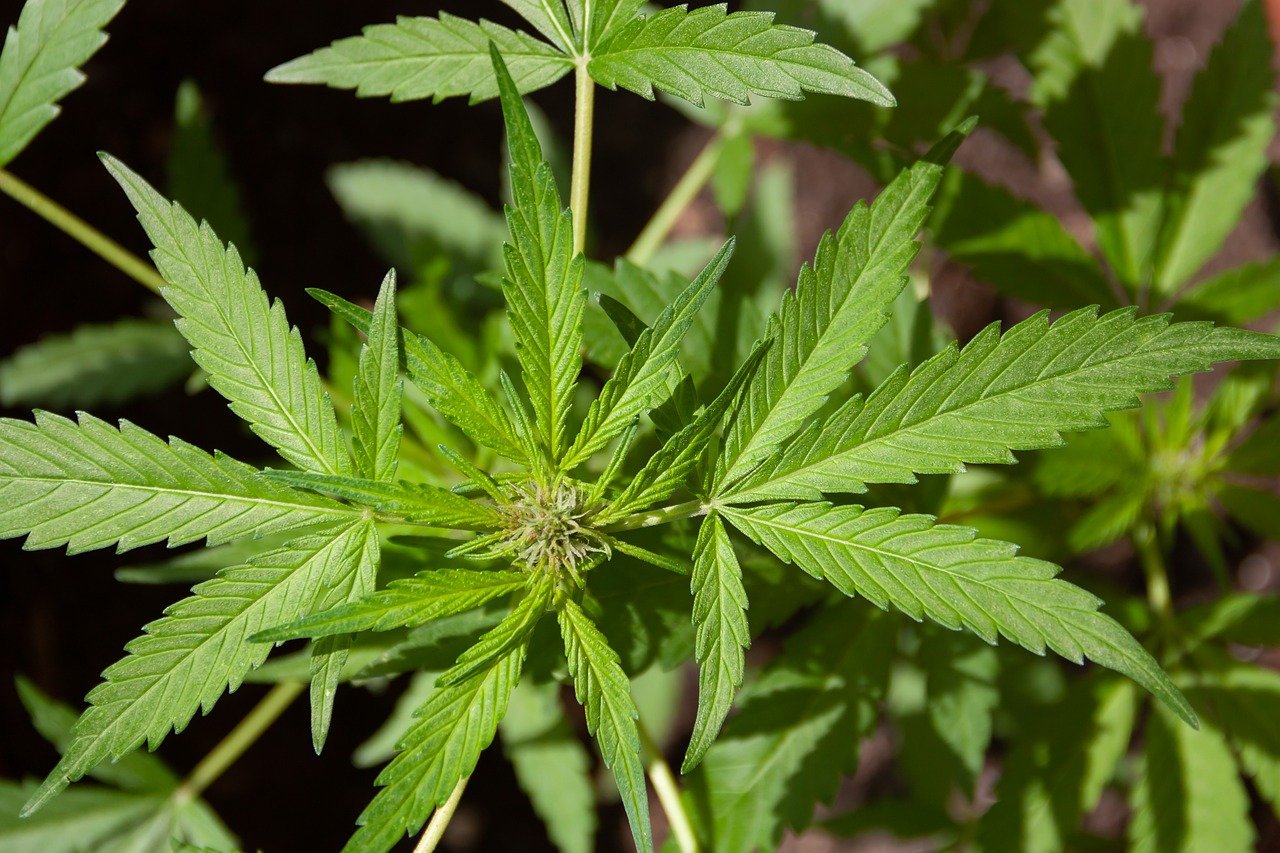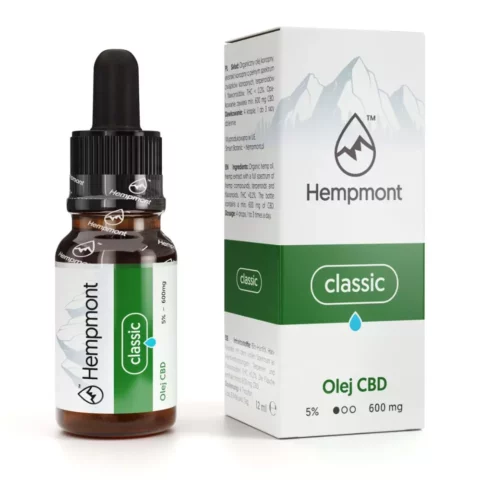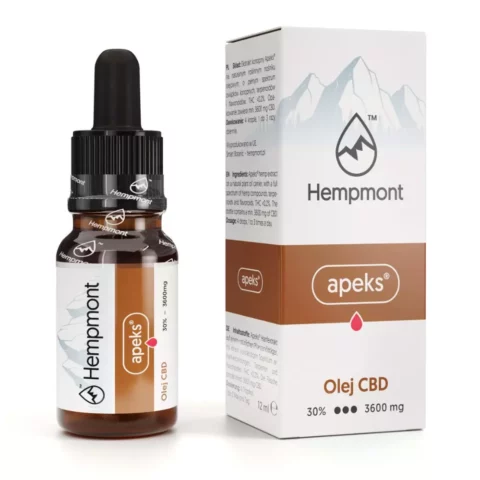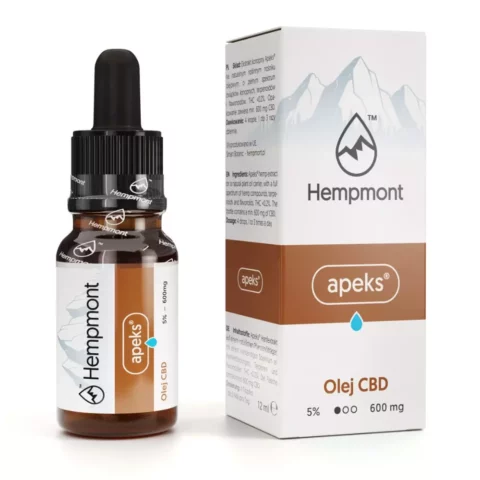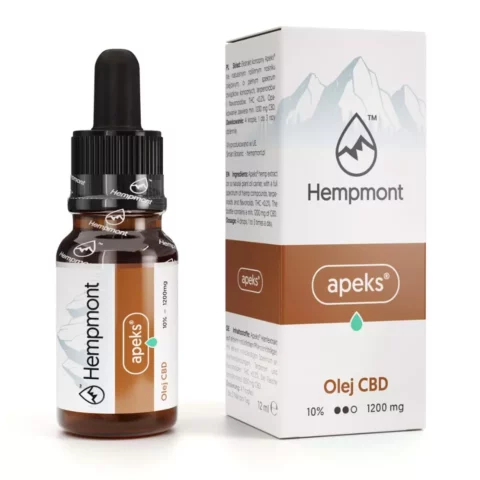Cannabidiol (CBD) and tetrahydrocannabinol (THC) are the two best studied cannabinoids. And although both compounds are found in cannabis, they are predominant in different species. CBD is extracted from hemp seed (Cannabis sativa), while THC is extracted from cannabis indica. And as more and more countries are softening their attitude towards cannabis, the question is increasingly being asked: which is better, THC or CBD? Unfortunately, sometimes there are a lot of myths hidden in the answers.
Differences between CBD and THC. Does CBD have THC in it?
The main difference between the two is that CBD and THC occur in hemp in different proportions. Fibre cannabis is dominated by CBD and the flowers are grown in such a way that the THC concentration does not exceed 0.2-0.3%, depending on what concentration is allowed by law in the country (in Poland it is 0.2%).
In cannabis, on the other hand, the THC concentration ranges from 15-30%, but the CBD content is only from 0.1-3.0%, i.e. very modest. However, some cannabis plants have CBD levels as high as 16%.
Another significant difference is that CBD, unlike THC, has no psychoactive or intoxicating properties. And no amount of CBD causes them.
Both cannabinoids have medical applications and basically affect the same conditions, even though they are used for inflammation, anxiety, eating disorders, migraines, epilepsy, chronic pain and many other ailments and conditions. However, these substances act in completely different ways. For example, the issue of appetite. CBD can control it, while THC stimulates the appetite.
CBD and all products containing cannabidiol from hemp seed are legal in Poland, widely available and sold without a prescription, THC is NOT.
And finally: none of these cannabinoids can be overdosed to lead to death.
Effects of CBD and THC on the endocannabinoid system
Both of these compounds, namely THC and CBD, consist of 21 carbon atoms, 30 hydrogen atoms and 2 oxygen atoms. That is, they have the same molecular structure. The difference, however, is that these atoms are arranged differently, making these cannabinoids interact quite differently on the endocannabinoid system.
It should be mentioned here that both CBD and THC interact with the cannabinoid receptors CB1 and CB2, but here too there is a difference. This is because THC attaches itself to the receptors and sends signals to the neurotransmitters. The result is relaxation, good mood and a world seen through rose-tinted glasses (supposedly). Unless, of course, too much is taken, which, instead of a good mood, can bring anxiety or panic attacks or even psychosis. All these unpleasant symptoms pass quite quickly fortunately.
The effects of CBD are slightly different. First of all, it does not have the same properties as THC, as it does not interact directly with receptors. Instead, cannabidiol stimulates the endocannabinoid system to produce cannabinoids and delays their breakdown by blocking the enzymes that break them down. But this is not the end of CBD's potential. It also affects the function of opioid, dopamine and serotonin receptors, which basically explains the analgesic, anti-inflammatory and anti-anxiety properties of cannabidiol.
Effects of CBD and THC on the brain
Both CBD and THC interact with the brain. However, the difference in the effects of this influence is dramatic. CBD, unlike THC, does not induce intoxication. In addition to this, research suggests that CBD can have a good effect on treating people with mild depression and also help to reduce psychosis. This is all because it interacts with the relevant receptors in the brain.
Medical properties of CBD and THC
Both cannabidiol and tetrahydrocannabinol have found their use in medicine. And it should be noted here that their effects are extremely versatile, although their pursuit of the goal (i.e. aiding therapy) is carried out in completely different ways.
Cannabidiol owes its popularity to Charlotte Figi. This girl with very severe epilepsy (with the so-called Dravete syndrome) gained the ability to function normally by taking CBD oil. While most doctors gave her no chance of improvement. And here, suddenly, such news is circulating the world. And this is what prompted scientists to research CBD to see if it has the same positive effect in other diseases. Research on cannabidiol is ongoing around the world, and the results in many cases are extremely promising. Indeed, it turns out that taking CBD oil has the potential to help treat a number of diseases and ailments, among them:
- just epilepsy,
- pain of various origins,
- inflammatory conditions,
- anxiety,
- depression,
- psychosis,
- allergy,
- diabetes,
- insomnia and others.
Tetrahydrocannabinol, on the other hand, is associated with its psychoactive effects, making it considered great for recreational use. Nevertheless, it also has medicinal properties and can be used in the treatment of many serious diseases and ailments such as:
- pain,
- Glaucoma,
- insomnia,
- muscle cramps,
- nausea,
- lack of appetite,
- anxiety,
- chronic stress,
- neurodegenerative disorders.
Side effects of CBD and THC
When writing about the differences between cannabidiol and tetrahydrocannabinol, one cannot fail to mention the diametrical differences in terms of the side effects caused by these substances.
As far as CBD is concerned, the human body tolerates the substance very well, regardless of the dose taken. The WHO has commented on this issue and the organisation's position is that possible side effects of cannabidiol are most often due to the interaction of CBD with concomitantly taken medicines. Most often, they are not too bothersome and manifest themselves as mild drowsiness, dry mouth and lowered heart rate.
With THC, on the other hand, it is somewhat different. Here, the dose taken is important. The higher the dose, the more intensely adverse effects can manifest themselves, among which are:
- temporary accelerated heartbeat,
- dry mouth,
- reddening of the eyeballs,
- slight coordination problems,
- anxiety and, in extreme cases, even paranoid reactions.
The important point is that neither CBD nor THC can be fatally overdosed.
Differences in the legal status of CBD versus THC
In contrast, the legal status of CBD and THC is completely different. THC is a prohibited substance in Poland and its possession, cultivation and use is penalised. Therefore, there is no question of legal use of products containing tetrahydrocannabinol. Therefore, all products such as oils, creams, ointments, capsules, extracts or food products containing THC are prohibited.
The situation is completely different with CBD, the substance found in fibre hemp. Polish law allows certain entities to cultivate and process it. The condition is that it can only contain trace amounts of THC, i.e. no more than 0.2%. Thus, CBD-rich products are fully legal in our country and authorised for sale in the form of: CBD oils, ointments, dried CBD flowers, capsules, pastes, jellies, concentrates. CBD isolates and CBD liquids (vaporisation oil).
Unfortunately, both the cultivation of hemp and its subsequent processing are not cheap, as they require advanced technology. What follows, CBD oils are also not cheap. However, when you consider their wide range of positive properties and effects on the body, cannabidiol supplementation is downright invaluable in supporting health.
Bibliography:
- "IS CBD REALLY NOT PSYCHOACTIVE?"; Dr Jahan Marcu, Ali S. Matthews and Martin A. Lee, 17 May 2016. https://www.projectcbd.org/science/cbd-really-non-psychoactive
- "Antidepressant and anti-anxiety effects of cannabidiol: a chemical compound of Cannabis sativa"; Alexandre R de Mello Schier, Natalia P de Oliveira Ribeiro et al; https://pubmed.ncbi.nlm.nih.gov/24923339/.
- "A critical review of the antipsychotic effects of cannabidiol: 30 years of translational research"; Antonio Waldo Zuardi, Jose Alexandre S Crippa, Jaime EC Hallak et al; https://pubmed.ncbi.nlm.nih.gov/22716160/
- "Cannabis stops a baby's severe seizures" (Charlotte Figi's story); Saundra Young, CNN; https://edition.cnn.com/2013/08/07/health/charlotte-child-medical-marijuana/index.html
- "CANNABIDIOL Pre(CBD); Review Report; Agenda Item 5.2"(WHO position paper on CBD); Geneva, 6th ninth Meeting,10 November 2017; http://www.who.int/medicines/access/controlled-substances/5.2_CBD.pdf
